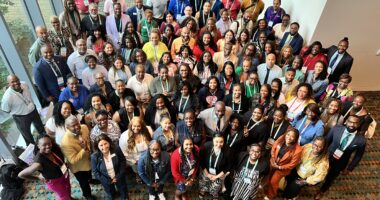President Barack Obama’s Back to School Speech
On September 14, President Barack Obama addressed America’s students from Julia R. Masterman Laboratory and Demonstration school in Philadelphia, Pa.
Watch the speech and read the transcript below.
Remarks of President Barack Obama
Back to School Speech
September 14, 2010
As Prepared for Delivery—
Hello Philadelphia! It’s wonderful to be here. Today is about welcoming all of you and all of America’s students back to school – and I can’t think of a better place to do it than Masterman. You’re one of the best schools in Philadelphia – a leader in helping students succeed in the classroom. And just last week, you were recognized as a National Blue Ribbon School for your record of achievement. That’s a testament to everyone here – students and parents, teachers and school leaders. And it’s an example of excellence I hope communities across America embrace.
Over the past few weeks, Michelle and I have been getting Sasha and Malia ready for school. And I bet a lot of you are feeling the same way they’re feeling. You’re a little sad to see the summer go, but you’re also excited about the possibilities of a new year. The possibilities of building new friendships and strengthening old ones. Of joining a school club, or trying out for a team. The possibilities of growing into a better student, and a better person, and making your family proud.
But I know some of you may also be nervous about starting a new school year. Maybe you’re making the jump from elementary to middle school, or from middle to high school, and worried about what that’ll be like. Maybe you’re starting a new school, and not sure how you’ll like it. Or maybe you’re a senior who’s feeling anxious about the whole college process; about where to apply and whether you can afford to go.
And beyond all these concerns, I know a lot of you are also feeling the strain of these difficult times. You know what’s going on in the news and your own family’s lives. You read about the war in Afghanistan. You hear about the recession we’ve been through. You see it in your parents’ faces and sense it in their voice.
A lot of you are having to act a lot older than you are; to be strong for your family while your brother or sister is serving overseas; to look after younger siblings while your mom works that second shift; to take on a part-time job while your dad is out of work.
It’s a lot to handle; it’s more than you should have to handle. And it may make you wonder at times what your own future will look like; whether you’ll be able to succeed in school; whether you should set your sights a little lower, and scale back your dreams.
But here is what I came to Masterman to tell you: nobody gets to write your destiny but you. Your future is in your hands. Your life is what you make of it. And nothing – absolutely nothing – is beyond your reach. So long as you’re willing to dream big. So long as you’re willing to work hard. So long as you’re willing to stay focused on your education.
That last part is absolutely essential – because an education has never been more important. I’m sure there will be times in the months ahead when you’re staying up late cramming for a test, or dragging yourselves out of bed on a rainy morning, and wondering if it’s all worth it. Let me tell you, there is no question about it. Nothing will have as great an impact on your success in life as your education.
More and more, the kinds of opportunities that are open to you will be determined by how far you go in school. In other words, the farther you go in school, the farther you’ll go in life. And at a time when other countries are competing with us like never before; when students around the world are working harder than ever, and doing better than ever; your success in school will also help determine America’s success in the 21st century.
So, you have an obligation to yourselves, and America has an obligation to you to make sure you’re getting the best education possible. And making sure you get that kind of education is going to take all of us working hand-in-hand.
It will take all of us in government – from Harrisburg to Washington – doing our part to prepare our students, all of them, for success in the classroom, in college, and in a career. It will take an outstanding principal and outstanding teachers like the ones here at Masterman; teachers who go above and beyond for their students. And it will take parents who are committed to your education.
That’s what we have to do for you. That’s our responsibility. That’s our job. But here’s your job. Showing up to school on time. Paying attention in class. Doing your homework. Studying for exams. Staying out of trouble. That kind of discipline and drive – that kind of hard work – is absolutely essential for success.
I know – because I didn’t always have it. I wasn’t always the best student when I was younger; I made my share of mistakes. In fact, I can still remember a conversation I had with my mother in high school, when I was about the age of some of you here today. It was about how my grades were slipping, how I hadn’t even started my college applications, how I was acting, as she put it, “casual” about my future. It’s a conversation I suspect will sound familiar to some of the students and parents here today.
And my attitude was what I imagine every teenager’s attitude is in a conversation like that. I was like, I don’t need to hear all this. So, I started to say that, and she just cut me right off. You can’t just sit around, she said, waiting for luck to see you through. She said I could get into any school in the country if I just put in a little effort. Then she gave me a hard look and added, “Remember what that’s like? Effort?”
It was pretty jolting, hearing my mother say that. But eventually, her words had their intended effect. I got serious about my studies. I made an effort. And I began to see my grades – and my prospects – improve. And I know that if hard work could make the difference for me, it can make the difference for you, too.
I know some of you may be skeptical about that. You may wonder if some people are just better at certain things. And it’s true that we each have our own gifts and talents we need to discover and nurture. But just because you’re not the best at something today doesn’t mean you can’t be tomorrow. Even if you don’t think of yourself as a math person or as a science person – you can still excel in those subjects if you’re willing to make the effort. And you may find out you have talents you’d never dreamed of.
You see, excelling in school or in life isn’t mainly about being smarter than everybody else. It’s about working harder than everybody else. Don’t avoid new challenges – seek them out, step out of your comfort zone, and don’t be afraid to ask for help; your teachers and family are there to guide you. Don’t feel discouraged or give up if you don’t succeed at something – try it again, and learn from your mistakes. Don’t feel threatened if your friends are doing well; be proud of them, and see what lessons you can draw from what they’re doing right.
That’s the kind of culture of excellence you promote here at Masterman; and that’s the kind of excellence we need to promote in all America’s schools. That’s why today, I’m announcing our second Commencement Challenge. If your school is the winner; if you show us how teachers, students, and parents are working together to prepare your kids for college and a career; if you show us how you’re giving back to your community and our country – I’ll congratulate you in person by speaking at your commencement.
But the truth is, an education is about more than getting into a good college or getting a good job when you graduate. It’s about giving each and every one of us the chance to fulfill our promise; to be the best version of ourselves we can be. And part of what that means is treating others the way we want to be treated – with kindness and respect.
Now, I know that doesn’t always happen. Especially not in middle or high school. Being a teenager isn’t easy. It’s a time when we’re wrestling with a lot of things. When I was your age, I was wrestling with questions about who I was; about what it meant to be the son of a white mother and a black father, and not having that father in my life. Some of you may be working through your own questions right now, and coming to terms with what makes you different.
And I know that figuring all that out can be even more difficult when you’ve got bullies in class who try to use those differences to pick on you or poke fun at you; to make you feel bad about yourself. In some places, the problem is more serious. There are neighborhoods in my hometown of Chicago, where kids have hurt one another. And the same thing has happened here in Philly.
So, what I want to say to you today – what I want all of you to take away from my speech – is that life is precious, and part of its beauty lies in its diversity. We shouldn’t be embarrassed by the things that make us different. We should be proud of them. Because it’s the things that make us different that make us who we are. And the strength and character of this country have always come from our ability to recognize ourselves in one another, no matter who we are, or where we come from, what we look like, or what abilities or disabilities we have.
I was reminded of that idea the other day when I read a letter from Tamerria Robinson, an 11-year old girl in Georgia. She told me about how hard she works, and about all the community service she does with her brother. And she wrote, “I try to achieve my dreams and help others do the same.” “That,” she wrote, “is how the world should work.”
I agree with Tamerria. That is how the world should work. Yes, we need to work hard. Yes, we need to take responsibility for our own education. Yes, we need to take responsibility for our own lives. But what makes us who we are is that here, in this country, we not only reach for our own dreams, we help others do the same. This is a country that gives all its daughters and all its sons a fair chance. A chance to make the most of their lives. A chance to fulfill their God-given potential.
And I’m absolutely confident that if all our students – here at Masterman, and across this country – keep doing their part; if you keep working hard, and focusing on your education; if you keep fighting for your dreams and if all of us help you reach them; then not only will you succeed this year, and for the rest of your lives, but America will succeed in the 21st century. Thank you, God bless you, and may God bless the United States of America.




